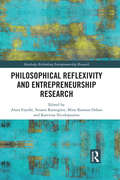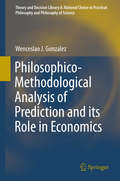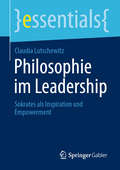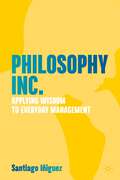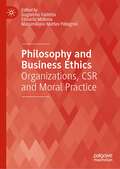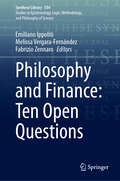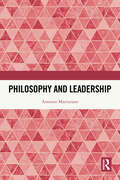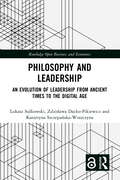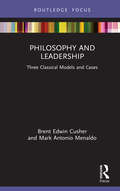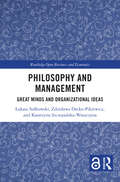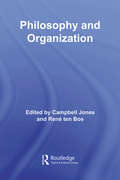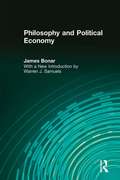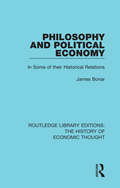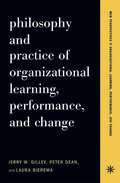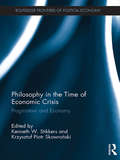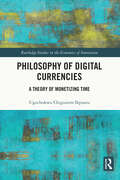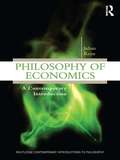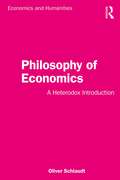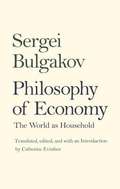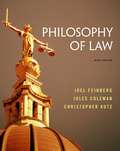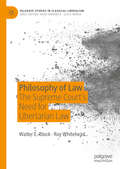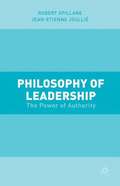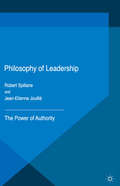- Table View
- List View
Philosophical Reflexivity and Entrepreneurship Research: New Directions in Scholarship (Routledge Rethinking Entrepreneurship Research)
by Alain Fayolle Stratos Ramoglou Mine Karatas-Ozkan Katerina Nicolopoulou"‘Philosophy is inescapable’. This is the powerful mantra and call to action of this authoritative and informative collection of essays. Acting upon the conviction that empirical scrutiny only takes us so far in understanding the full nature of entrepreneurship, this text provides a set of thoughtful, and refreshing commentaries on the different ways in which philosophical assumptions shape entrepreneurship research. Entrepreneurship scholarship will be richer for the reading of it." Denise Elaine Fletcher, Professor of Entrepreneurship and Innovation, University of Luxembourg, Luxembourg. "This book offers the reader a variety of philosophical ideas and approaches to spur reflection on taken for granted assumptions about what entrepreneurship is and the ways entrepreneurship scholars understand this phenomenon. The chapters in this book go beyond critiquing current ideas and perspectives, rather, the book opens up important lines of inquiry in such topic areas as: uncertainty, the imagination, social construction, critical realism, and the nature of failure. I expect that many of the insights from this book will provide directions for major avenues of entrepreneurship scholarship over the next decade. Scholars who want clues about the future direction of the entrepreneurship field would be wise to explore this book." William B. Gartner, Bertarelli Foundation Distinguished Professor of Family Entrepreneurship, Babson College, USA
Philosophico-Methodological Analysis of Prediction and its Role in Economics
by Wenceslao J. GonzalezThis book develops a philosophico-methodological analysis of prediction and its role in economics. Prediction plays a key role in economics in various ways. It can be seen as a basic science, as an applied science and in the application of this science. First, it is used by economic theory in order to test the available knowledge. In this regard, prediction has been presented as the scientific test for economics as a science. Second, prediction provides a content regarding the possible future that can be used for prescription in applied economics. Thus, it can be used as a guide for economic policy, i. e. , as knowledge concerning the future to be employed for the resolution of specific problems. Third, prediction also has a role in the application of this science in the public arena. This is through the decision-making of the agents -- individuals or organizations -- in quite different settings, both in the realm of microeconomics and macroeconomics. Within this context, the research is organized in five parts, which discuss relevant aspects of the role of prediction in economics: I) The problem of prediction as a test for a science; II) The general orientation in methodology of science and the problem of prediction as a scientific test; III) The methodological framework of social sciences and economics: Incidence for prediction as a test; IV) Epistemology and methodology of economic prediction: Rationality and empirical approaches and V) Methodological aspects of economic prediction: From description to prescription. Thus, the book is of interest for philosophers and economists as well as policy-makers seeking to ascertain the roots of their performance. The style used lends itself to a wide audience.
Philosophie der Führung
by Dieter Frey Lisa Katharin SchmalzriedFührungskräfte arbeiten heute in einem unsicheren Umfeld mit wachsenden Anforderungen und immer variableren Rahmenbedingungen. Dennoch müssen sie Sicherheit ausstrahlen und ihren Mitarbeitern eine Orientierung bieten. Viele Führungskräfte empfinden dies als belastend und suchen nach einer Art Kompass, an dem sie ihr Handeln ausrichten können, nach dauerhaften Prinzipien für eine "gute Führung". Dieses Buch bietet einen solchen Kompass und leitet dazu "neue" Erkenntnisse aus uralten Theorien ab: Hätten Sie gedacht, dass die großen Philosophen von Kant über Rousseau bis Popper Anregungen für Ihr tägliches Führungshandeln bereit halten? - Wie Sie nach Ansicht Aristoteles als Chef ein gutes Vorbild werden? Wie Sie laut Hobbes mit egoistischen Mitarbeitern umgehen können? Wie nach Popper ein kritischer Dialog zu besseren Entscheidungen führen kann? Den Autoren dieses Buches gelingt es, in übersichtlichen Kapiteln verständlich und knapp die Grundlagen einer Theorie zu erklären, praktische Hinweise für eine moderne Führungskraft abzuleiten und schließlich ein verständliches Modell einer ethikorientierten Führung zu formulieren. - Kernthese: Gute Führung, die sich moralischen Werten verpflichtet sieht, ist auch eine erfolgreiche Führung! Und ganz nebenbei liest sich das Buch als eine unterhaltsame Einführung in die großen philosophischen Theorien. Für alle, die mit Aufgaben der Menschenführung betraut sind, ob in sozialen und kommerziellen Organisationen, im Bildungsbereich oder der Kindererziehung.
Philosophie im Leadership: Sokrates als Inspiration und Empowerment (essentials)
by Claudia LutschewitzDie gegenwärtig wachsenden Veränderungen im beruflichen und unternehmerischen Umfeld erfordern von Führungskräften eine ständige Transformation. Manch eine Führungskraft mag sich daher eine Art Kompass zur richtigen Navigation wünschen. Dieser Kompass kann die Philosophie sein, denn zu richtigen Entscheidungen gelangt der Mensch dann, wenn er die Fähigkeit besitzt, präzise und in prinzipiellen Zusammenhängen zu denken. Da die Philosophie von jeher die Schule des Denkens ist, stellt sie in der Verbindung mit Leadership eine hervorragende Möglichkeit dar, über die eigenen Handlungsspielräume und -muster als Führungskraft zu reflektieren, sich neuen Perspektiven zu öffnen und damit die eigene sowie den Zugang zu fremden Wahrnehmung zu schärfen.
Philosophy Inc.: Applying Wisdom to Everyday Management
by Santiago IñiguezWhile most managers are primarily concerned with being able to make decisions quickly, manage meetings efficiently and drive innovation, there is often little time for reflection in a business world where opinions must be formed and decisions taken on the hoof. It often seems counterintuitive to stop the clock and take time to think things through. Philosophy, on the other hand, addresses the basic questions of our existence, our identity, our role in the world and the models for living that might inspire our actions. By understanding philosophy, it becomes more possible to provide meaning to many of our management practices and to business at large, while enhancing self-satisfaction and happiness at work. This latest book from Professor Santiago Iniguez presents a collection of management ideas inspired by renowned philosophers. It provides a framework, as well of a series of business situations, for analyzing decisions from the perspective of values and principles. With insights on topics such as, how to gain respect at work, how to cultivate an optimistic outlook and how to shrug off failure, it offers timeless advice for managers that can be applied for their personal and professional development. Offering a unique perspective and valuable insights on what leadership is, and the relevance of values and principles to becoming a successful, recognized manager, this book presents a thoughtful guide to anyone who wants to install meaning into their management practices and their lives.
Philosophy and Business Ethics: Organizations, CSR and Moral Practice
by Edoardo Mollona Guglielmo Faldetta Massimiliano Matteo PellegriniThis book explores the relationship between philosophy and business ethics. Academics and practitioners often muse about the ethical and moral aspect of management and business actions, but these studies can lack a deeper philosophical grounding. Contributors to this volume challenge this gap by applying different philosophical paradigms and theories to business management issues. The territory covered by the contributions collected in this book spans from the foundations of business management literature itself, to the role of philosophy in new business models and technology; from the way philosophical theory can explain – and encourage – ethical firm behaviour, to the political stance that an organization takes. Contributors take a holistic approach to business and management, bringing together real-world examples and rich academic theory, creating an interdisciplinary volume, with international authors. Covering important topics such as corporate social responsibility, sustainability, leadership, and stakeholder relations, this book will be of interest to academics working in the field of business ethics, philosophy and management studies.
Philosophy and Finance: Ten Open Questions (Synthese Library #504)
by Emiliano Ippoliti Melissa Vergara-Fernández Fabrizio ZennaroThis volume presents ten thought-provoking essays exploring issues in the philosophy of finance that are crucial for the economy and society. They also show the mutual relations and benefits between finance and philosophy. These issues include the link between financial systems and climate change, the ontologies of finance that are essential for market design, the role and effect of AI in the financial systems, the nature and prospects of money and their digital version, methodological problems in the use of models and mathematics in the financial world, and critical discussions of some of the main theories on financial systems, like the efficient market hypothesis. As this volume covers a wide array of topics whilst still forming a coherent whole, it is of interest to philosophers of finance, philosophers of science, epistemologists, and philosophers of economics, as well as to scientists and practitioners interested in the debates over methodological, ontological, epistemological as well as ethical issues in finance.
Philosophy and Leadership
by Antonio MarturanoThe birth of philosophical thought across the ancient world brought with it a keen interest in the study of leadership– reflections on who should lead and on how to create the best leadership structures became central to the debates of most prominent ancient philosophers.Philosophy and Leadership offers a panorama of the main philosophies, both ancient and modern, which form the basis of contemporary leadership theories. This book will draw on many philosophical positions to offer a critique of the most important nodes of modern leadership studies–such as ethics, purpose, meaning, and legacy. It will include probing questions and theoretical as well practical exercises aimed at reinforcing the points discussed in each chapter, as well as examples from history, literature, films, and music.This book will be invaluable reading for scholars on undergraduate and postgraduate leadership courses, as well as those studying philosophy, leadership ethics and business ethics, and responsible leadership.
Philosophy and Leadership: An Evolution of Leadership from Ancient Times to the Digital Age (Routledge Open Business and Economics)
by Łukasz Sułkowski Katarzyna Szczepańska-Woszczyna Zdzisława Dacko-PikiewiczPhilosophy and Leadership is an ambitious exploration of leadership's philosophical underpinnings from antiquity to the AI-driven future. The book journeys through history, gleaning insights from eminent philosophers and contextualizing their teachings to leadership.The book's foundational premise lies in the symbiosis of philosophy and leadership. Philosophy provides the "why" that drives the practices and decisions in leadership. This intricate connection is unfolded from the teachings of Confucius on virtue and ethics to the contemporary dialogues of Judith Butler on leadership identity. The book also delves into the evolution of leadership concepts through various eras—medieval times highlighting religious and scholastic perspectives, the Renaissance juxtaposing Machiavellian pragmatism with More's utopian ideals, and the Enlightenment era underscoring the importance of duty, skepticism, and rationality. An exciting aspect of the narrative is the amalgamation of evolution and leadership. By drawing parallels between Darwin's natural selection and leadership dynamics or Bergson's vitalism and intuitive leadership, the authors present a merger of biological evolution with leadership's ever-evolving paradigms. Finally, the concluding chapters reside in envisioning the future and reflect upon the impending synergy between AI and leadership. They emphasize the importance of amalgamating philosophical wisdom with the promises and challenges brought about by AI.The book will guide readers from the philosophical epochs of yore to the AI-predicted leadership paradigms of the future. By intertwining the enduring wisdom of philosophers with the dynamic nature of leadership, this book serves as a beacon for anyone aspiring to lead in any era.
Philosophy and Leadership: Three Classical Models and Cases (Leadership Horizons)
by Brent Edwin Cusher Mark Antonio MenaldoToday, managers, politicians, educators, and healthcare providers are highly skilled technicians who navigate modern systems. However, followers seek more than know-how; they desire moral leadership. Even leaders equipped with skills must make difficult ethical choices. This book connects philosophy to leadership by examining three representative texts from the history of philosophy: Plato’s Republic, Aristotle’s Nicomachean Ethics, and Niccolò Machiavelli’s The Prince. The leadership ideas contained in each one of these philosopher’s works were not only pioneering for their age but continue to be relevant today because they provide insight into the enduring questions of leadership. The book demonstrates the timeliness of the classical works by applying these philosophical approaches to historical and contemporary cases. This book is ideal for readers who are acquainted with philosophy and those who are uninitiated. The connections made between philosophy, leadership literature, and real-life leaders enable readers to appreciate how deeper reflection into the themes of leadership might merit scholarly attention and bear witness to the close union between the philosophy of leadership and the real world.
Philosophy and Management Studies: A Research Overview (State of the Art in Business Research)
by Raza Mir Michelle GreenwoodIrrespective of whether one thinks of philosophy explicitly, each organizational researcher is a philosopher. A philosophical position is predicated on a variety of approaches relating to ontology, epistemology, methodology, ethics, and political positions. Depending on where one stands with regard to these philosophical building blocks, their orientation may be characterized as positivist, realist, critical-realist, and constructivist, with pragmatist and political considerations weighing in as well. Also, management theories all inhabit the same spectrum of philosophical positions that enrich them and add to their relevance to the world of firms and organizations. This book provides a broad-based commentary on the terrain of philosophy as it pertains to management studies, especially for the relatively unfamiliar organizational theorist. This book serves as a succinct overview of the field of management philosophy as well as a roadmap for those readers who wish to explore the terrain further. The book argues that all knowledge inquiry invokes philosophy and philosophical thinking, and that the artificial separation between philosophy and social science is fallacious. Just as philosophy is everywhere, so is power, and for better or worse they go hand in hand. Hence, philosophical positions are political positions. The authors do not shy from addressing the politics of their own research practice or the subjects of their inquiry. Philosophy and Management Studies targets a new generation of management researchers, whose interest in philosophy vastly exceeds their resources to engage with it, partly because of their unfamiliarity with its often mystifying and outsider-unfriendly conventions. It seeks to bridge the chasm between interest in philosophy in organizational studies and knowledge about it. It is not for the trained philosopher or the expert, but for a relative newcomer.
Philosophy and Management: Great Minds and Organizational Ideas (Routledge Open Business and Economics)
by Łukasz Sułkowski Katarzyna Szczepańska-Woszczyna Zdzisława Dacko-PikiewiczThis book invites readers on an intellectual journey where the great minds of philosophy intersect with contemporary organizational challenges.With classical and modern philosophical thought as its backbone, Philosophy and Management: Great Minds and Organizational Ideas demonstrates that the most renowned thinkers in human history, such as Aristotle, Confucius and Nietzsche, provide timeless wisdom for navigating the complexity of today’s business environments. Combining theoretical insights with practical applications, this book presents philosophical frameworks as robust foundations for decision-making, conflict resolution and leadership strategies. It explores crucial areas such as strategic management, human resources, ethics, corporate governance and innovation, challenging readers to explore management from a reflective and ethical perspective, and shows how philosophy equips leaders to build resilient and morally responsible organizations, which are essential in an age dominated by technological advancement and rapid societal changes.The book fills a significant gap in management literature, which often lacks deep philosophical reflection on organizational practices. It draws on ancient, modern and postmodern thought, connecting these insights to current management theories, thus, making it an invaluable resource for both practitioners and scholars.The Open Access version of this book, available at http://www.taylorfrancis.com, has been made available under a Creative Commons Attribution-Non Commercial-No Derivatives (CC BY-NC-ND) 4.0 license.
Philosophy and Organization
by Campbell Jones René Ten BosFeaturing original contributions from some of the most exciting scholars writing at the intersection of philosophy and organization today, this accessible volume provides readers with a complete overview of this complex subject. Ground-breaking and drawing on recent efforts in management and organization studies to take philosophy seriously, it critically engages with the way that philosophy might inform organization and illuminates a range of issues, including idleness, aesthetics, singularity, transparency, power and cruelty. Exploring why philosophy matters to organization and why organization matters to philosophy, this book is essential reading for philosophy and business and management students as well as of interest to all those who seek to think seriously about the way their lives are organized.
Philosophy and Political Economy: In Some Of Their Historical Relations (Routledge Library Editions: The History Of Economic Thought Ser.)
by James BonerThis volume is one of the most remarkable works in the history of economic thought. First published in 1893, its principal significance rests in its argument that economic theory, however technical or pragmatic, is necessarily formed by and derives its meaning from larger moral and philosophical systems and assumptions. Bonar traces the inexorable presence of this moral and philosophical element in a vast, though highly nuanced, survey of the economic aspect of major thinkers from Plato to Darwin and demonstrates how modern economic thought, in turn, grew out of one or another branch of philosophy. Bonar begins with a consideration of Plato and Aristotle, examining their conceptions of wealth, production and distribution, and civil society. Discussions of the Stoics, Epicurians, and early Christianity explore complications introduced by these bodies of thought. His analysis of the classical and medieval world is followed by an extensive treatment of the concept of natural law, from the Renaissance through the Enlightenment, describing its influence and its relation to ideas of natural rights. The book's later sections concentrate on the dominant modes of ninteenth-cen-tury thought: utilitarianism, idealism, and materialism. Bonar identifies and explores the philosophical topics on which the conduct of technical economic analysis makes assumptions: human nature and human wants, the nature and role of the state, the relation of the individual to society, the nature and origin of property, and the role of ideals in socioeconomic life. He concludes by examining the implications for economics of the theory of evolution arising from the work of Darwin and others. The continuing interest of this volume for economists, philosophers, and sociologists lies in Bonar's contention that at the heart of the relationship of philosophy to economics is the problem of order: the ongoing need to reconcile conflicts between freedom and control, continuity and change, hierarchy and equality. In his reading, the fundamental question to which philosophy and economics are both brought to bear is that of changing the structure of power and opportunity in the social economy. This is, in short, a classic in the history of economics as well as the economic element in intellectual history.
Philosophy and Political Economy: In Some of Their Historical Relations (Routledge Library Editions: The History of Economic Thought)
by James BonarThis classic text, first published in 1893, was the first attempt to present a view of the relations of philosophy and economics through the whole of their history. In tracing the history of this relationship the author begins by examining the work of the ancient philosophers and continues with the followers of the theory of natural law. He then explores the utilitarian economics and the ‘idealistic economics’. This title will be of interest to students of the history of economic thought.
Philosophy and Practice of Organizational Learning, Performance, and Change
by Laura Bierema Jerry W. Gilley Peter DeanIn this book, the authors integrate the three dominant approaches to organizational development-learning, performance, and change-to create a dynamic lens through which to analyze any HRD program or initiative.
Philosophy in the Time of Economic Crisis: Pragmatism and Economy (Routledge Frontiers of Political Economy)
by Kenneth W. Stikkers Krzysztof Piotr SkowrońskiFor over 2000 years, economics was studied in the West as a branch of ethics, or moral philosophy. Presently, though, few economists and no textbook in economic orthodoxy claim any close connection between economic science and philosophy. However, might the current ‘crises’ in economics, and in the economics profession have their deep roots in the separation of economics from philosophy and ethics? American pragmatism, among the various contemporary philosophic traditions, lends itself specially to dialogue with economics because of its view of philosophy as an instrument for solving the real, concrete problems of human life, both personal and social. The essays in this volume, drawing heavily on the tradition of pragmatism, suggest that the economic crises of our time (the 2008 collapse of real estate and finance markets) might not be merely technical in nature - that is, the result of faulty applications of economic tools by politicians and policy makers, based up conventional economic models - but also due to the faulty philosophical assumptions underlying those models. These essays suggest that the overcoming of our current economic crises requires that economists once again become moral philosophers, or that philosophers once again engage themselves in economic matters. In either case, this volume aims to foster dialogue between the two disciplines and in that way, contribute to the improvement of contemporary economic life. This book is suitable for those who study political economy, economic theory and economic philosophy.
Philosophy of Digital Currencies: A Theory of Monetizing Time (Routledge Studies in the Economics of Innovation)
by Ugochukwu Chigoziem IkpeazuCurrent systems are failing the poor because these systems are unable to provide the financial inclusion needed for basic subsistence and commerce, which in turn would drive micro- and macro-economic growth. This book introduces the reader to a new way of thinking about how value can be created, captured, measured, and understood, economically and financially, and within the context of social contracts. It underscores the need to revisit such models through technological advancements, namely, Industrial Revolution 4.0, in order to solve pressing global issues such as economic inclusion and poverty eradication. The book proposes that for humanity to make the leap forward and for any real sustainable development to occur, the world needs a disruptive approach to value creation using currency systems, considering that currencies underpin value exchange. This disruption will result in a level of decentralization that facilitates peer-to-peer value exchange and drives financial inclusion, all of which should be underscored by a new, digital social contract. The author asserts that a time-based digital currency could address these issues by creating a new and truly inclusive currency model that allows economies to gain more value than previously possible. In addition, by leveraging 4IR technologies, a currency system can be designed where each unit of money accurately reflects the context and range of socio-economic factors that influence each human interaction. This book is aimed at futurists, technologists, researchers, policymakers, and anyone that is curious about how technology could make a difference in our collective futures. It cuts across a range of subject areas from economics, finance, philosophy, innovation to social development and takes an interdisciplinary approach to present a logical framework and theoretical foundation for the monetization of time as a digital currency.
Philosophy of Economics: A Contemporary Introduction (Routledge Contemporary Introductions to Philosophy)
by Julian ReissPhilosophy of Economics: A Contemporary Introduction is the first systematic textbook in the philosophy of economics. It introduces the epistemological, metaphysical and ethical problems that arise in economics, and presents detailed discussions of the solutions that have been offered. Throughout, philosophical issues are illustrated by and analysed in the context of concrete cases drawn from contemporary economics, the history of economic ideas, and actual economic events. This demonstrates the relevance of philosophy of economics both for the science of economics and for the economy. This text will provide an excellent introduction to the philosophy of economics for students and interested general readers alike.
Philosophy of Economics: A Heterodox Introduction (Economics and Humanities)
by Oliver SchlaudtPhilosophy of Economics: A Heterodox Introduction provides an introduction to the philosophy of economics through the prism of heterodoxy. Heterodox economics covers a range of approaches and schools of thought but what they have as a common denominator is the conviction that economic phenomena cannot be understood, and thus must not be studied, in isolation from their relevant context. Conversely, the current form of neoclassical economics emerged from the conviction that there is something like economic rationality sui generis which can be treated independently from all other aspects of our world, social or natural. Heterodox approaches challenge this conviction, from a variety of angles: the economic actor is not isolated, but lives in society which shapes him; market goods are only one kind of goods among others, constituting a larger set with ambiguous and shifting inner frontiers; production of goods takes place within nature, is subjected to physical laws and induces in most cases ecologically problematic fluxes of matter (e.g. waste); finally, the whole economic process in general is not in equilibrium, but shows secular trends through which it is connected to the historical world. This book demonstrates the vitality of these heterodox challenges from a philosophical point of view because not only do they formulate new hypotheses within economics, but they challenge economic theory on a much more fundamental level: how is the economy situated in the world, and which are the right methods for its investigation? This book is an ideal introduction for anyone seeking alternative or critical perspectives on the philosophy of economics and economic theory.
Philosophy of Economy: The World as Household
by Sergei Nikolaevich Bulgakov Catherine EvtuhovThe writings of Sergei Bulgakov (1871-1944), like those of other major social thinkers of Russia's Silver Age, were obliterated from public consciousness under Soviet rule. Discovered again after eighty years of silence, Bulgakov's work speaks with remarkable directness to the postmodern listener. This outstanding translation of Philosophy of Economy brings to English-language speakers for the first time a major work of social theory written by a critical figure in the Russian tradition of liberal thought. What is unique about Bulgakov, Catherine Evtuhov explains in her introduction to this book, is that he bridges two worlds. His social thought is firmly based in the Western tradition, yet some of his ideas reflect a specifically Russian way of thinking about society. Though arguing strenuously in favor of political and social liberty, Bulgakov repudiates the individualistic basis of Western liberalism in favor of a conception of human dignity that is compatible with collectivity. His economic theory stresses the spiritual content of life in the world and imagines national life as a kind of giant household. Bulgakov's work, with its singularly postmodern balance between Western and non-Western, offers fascinating implications for those in the process of reevaluating ideologies in post-Soviet Russia and in America as well.
Philosophy of Law
by Jules Coleman Christopher Kutz Joel FeinbergThis leading anthology contains essays and cases written by some of the most influential figures in legal philosophy, representing the major theoretical positions in the field. Its primary focus is to relate traditional themes of legal philosophy to the concerns of modern society in a way that invigorates the former and illuminates the latter. This classic text is distinguished by its clarity and accessibility, balance of topics, balance of positions on controversial questions, topical relevance, imaginative use of cases and stories, and the inclusion of only lightly edited or untouched legal classics. This revision is distinguished by its inclusion of new material on law and economics, international law, distributive justice, religion and freedom of expression, feminist legal theory, and critical race theory, as well as a greater emphasis on concrete legal problems.
Philosophy of Law: The Supreme Court’s Need for Libertarian Law (Palgrave Studies in Classical Liberalism)
by Walter E. Block Roy WhiteheadLooking at discrimination, education, environment, health and crime, this volume analyses United States Supreme Court rulings on several legal issues and proposed libertarian solutions to each problem. Setting their own liberal theory of law, each chapter discusses the law at hand, what it should be, and what it would be if their political economic philosophy were the justification of the legal practice. Covering issues such as sexual harassment, religion, markets in human organs, drug prohibition and abortion, this book is a timely contribution to classical liberal debate on law and economics.
Philosophy of Leadership: The Power of Authority
by Jean-Etienne Joullié Robert SpillanePhilosophy of Leadership.
Philosophy of Leadership: The Power of Authority
by Jean-Etienne Joullié Robert SpillanePhilosophy of Leadership has been written to arouse curiosity, not to satisfy it. The authors point out ideas about leadership which draw upon both ancient and modern wisdom. This book develops a philosophy of leadership by tracing the evolution of Western ideas from philosophical perspectives, ancient and modern.
